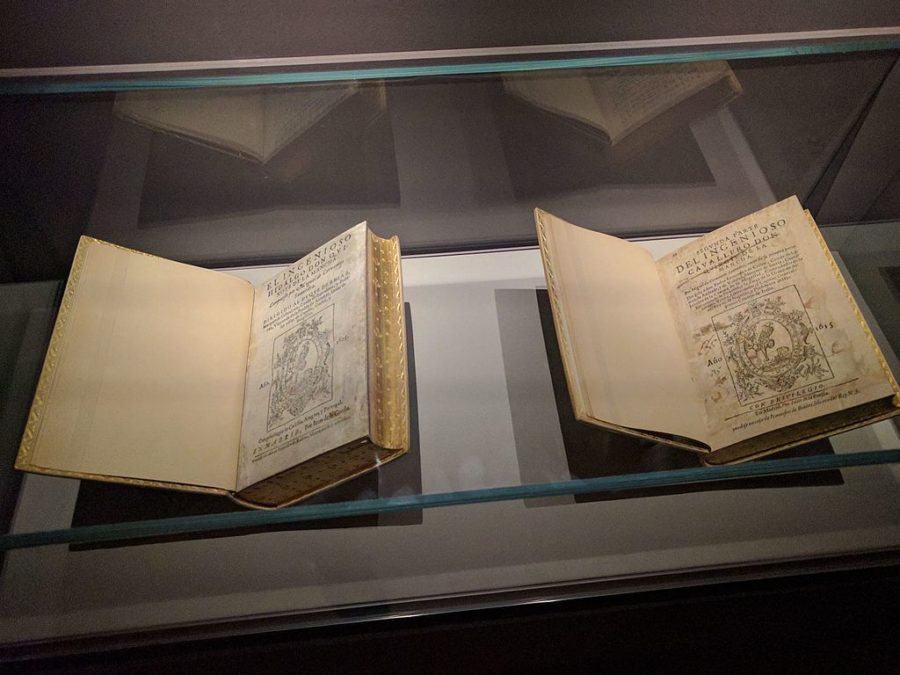In “Pierre Menard, Author of the Quixote”, Borges plays with ideas of authorship and originality by inventing a French Symbolist poet who embarks on the impossible task of composing Don Quixote.
Welcome to this gradual journey through the Collected Fictions of Jorge Luis Borges. Today I’m reviewing “Pierre Menard, Author of the Quixote”. For other Borges stories, see my Borges Marathon page.
Many of the stories in the “Garden of Forking Paths” collection are extended thought experiments, and “Pierre Menard, Author of the Quixote” is no exception. In this case, Borges plays with ideas of authorship and originality by inventing a French Symbolist poet who embarks on the impossible task of composing Don Quixote.
Pierre Menard’s aim is not to compose a new Quixote—Borges is disparaging about “those parasitic books that set Christ on a boulevard, Hamlet on La Cannabière, or don Quixote on Wall Street.” He doesn’t want to update Quixote in any way—he wants to compose the original Quixote, just as Cervantes did in the early 17th century.
But this doesn’t mean copying or transcribing either. It means:
“Learn Spanish, return to Catholicism, fight against the Moor or Turk, forget the history of Europe from 1602 to 1918—be Miguel de Cervantes.”
Once he has accomplished this, Menard hopes to be able to compose Don Quixote just as Cervantes did, making his own work match the original word for word.
Naturally, he doesn’t get very far. Before his death, he only manages to complete a few fragments. Nevertheless, Borges enthusiastically reviews these fragments, commenting on the differences between the Cervantes and the Menard, even though the words are identical.
The point, of course, is that we read texts differently depending on when and by whom they were written. It’s a humorous story that pokes a bit of fun at pompous literary criticism, but it also makes some serious points. We would read Don Quixote differently if it had been written by a 20th-century French Symbolist poet. We’d read it with the history of Europe in the intervening four centuries in mind, and we’d have different expectations of it as a text.
I don’t think it’s really an interesting enough concept to sustain the story, however. Other thought experiments in recent stories, like a world with no objective reality and a review of a non-existent book, have been more interesting to me. “Pierre Menard” was interesting but not one of my favourites. The style is deliberately dry and pedantic because it’s mimicking a certain style of literary essay, so that doesn’t help either.
One question I had as I was reading was why Borges made Pierre Menard a Symbolist poet. I think there’s probably some significance to this, but I don’t know enough about the Symbolist movement to understand it. If anyone knows, please leave a comment to enlighten me!




There are 4 comments
From Wikipedia: “Symbolism was a late 19th-century art movement of French and Belgian origin in poetry and other arts seeking to represent absolute truths symbolically through language and metaphorical images, mainly as a reaction against naturalism and realism.” Its aim was to “clothe the ideal in a perceptible form.” Don Quixote by Cervantes was about the ridiculous adventures which occur in the real world when Quixote tries to live out the dreams he has absorbed from all the novels of chivalry which drove him to insanity. But he himself becomes the perceptible form in which the ideal of chivalry is clothed. Menard, by following a movement which emphasizes the ideal over realism and naturalism, tries and largely fails to recreate the Don Quixote thought experiment.
Thanks very much, Richard! I love it when I ask questions in these posts and get such interesting answers. Your explanation makes perfect sense and ties in well with the themes of the story, so thanks very much for the contribution! It helped me understand the story better and will help anyone who comes along to read this post later.
The idea of comparing Menard’s fragments to Cervantes even though they are exactly the same strikes me as be pretty funny, but given Richard’s comment and your observation about how we read texts differently depending on their context, there is some deep observation about literature Borges seems to be getting at that I can’t quite put my finger on.
Yes, it is quite a funny story in places, Stefanie. The absurdity of Borges making an erudite comparison of two identical texts was quite entertaining and reminded me of some lit crit I’ve read over the years 😉 But yes, he’s also making some serious points about how we read, how writers write, idealism vs. realism, etc. So although this wasn’t my favourite story by any means, I do admire it.